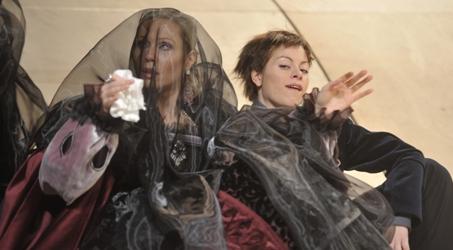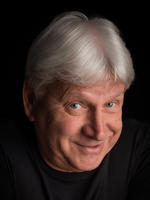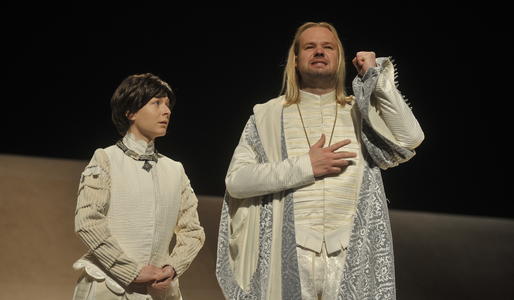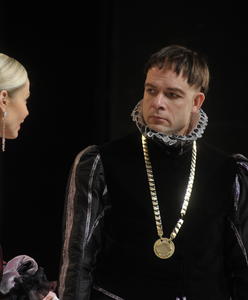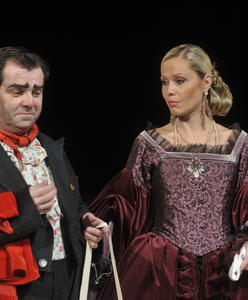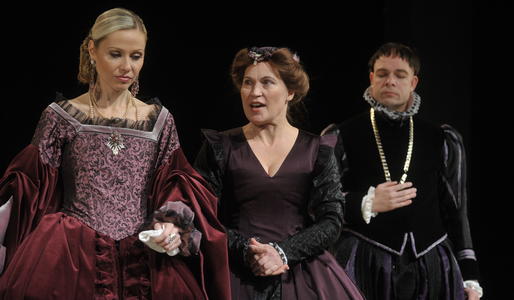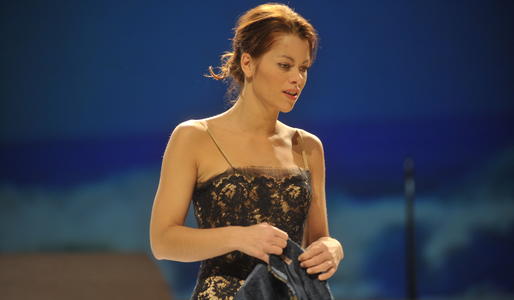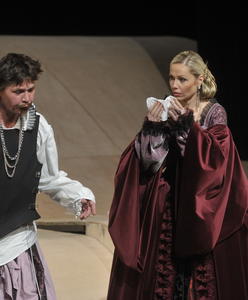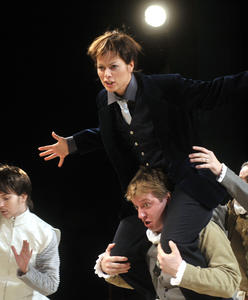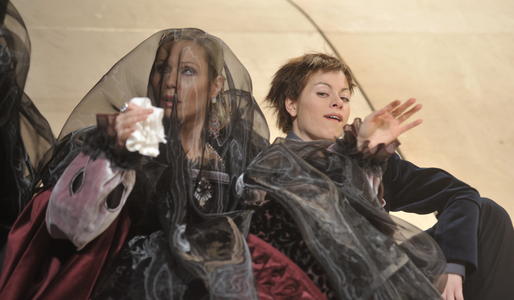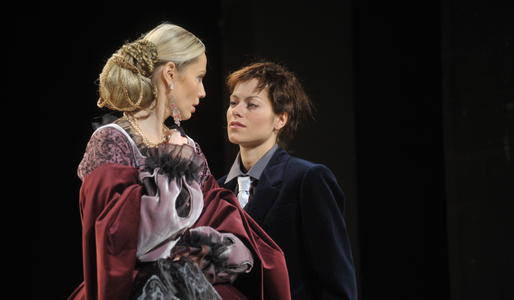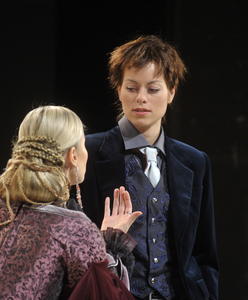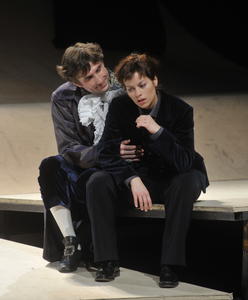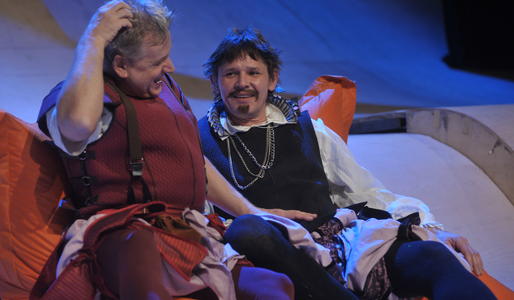Twelfth Night in Brno is like a pure bred Bandog from a fantastic litter
David Fadinger 9. May 2009 zdroj Literární noviny
This late comedy by an experienced playwright is an unrestrained carnival slapstick comedy, poetically grotesque and ironic, but also somewhat bitter when it approaches tragedy. Its production at Brno City Theatre is another of those progressive productions which are trying to move the focus of interpretation and address also the spectators, who accept everything with a certain degree of restraint due to being tired by endless variations.
The subtitle ('or What You Will') admits that those who identified that the text contains a conglomeration of many characters and plots from the author's previous dramas were right. The substance of Twelfth Night is formed from the obligatory components of the comedy theatre of that time, proven stage tricks and popular figures. And so it presents a compact composition of conflicts (particularly involving love, of course). Parallel tensions between the characters result in tangled situations, both comic and tragic. The result, which is typical of Shakespearean dramatic situations, is a play within a play which puzzles the spectators with costumes (a woman dressed as a man) and the motif of the exchange of two identical twins.
Poetry with simultaneous gesticulation
It seems that the language of this distinctive poet, with which he can express laughter as well as tragedy, villainy as well as nobility, cruelty as well as humanity, darkness as well as brightness in any dramatic circumstances, experiences a purifying revision with every new translation. This purifies from below the layer of poeticism, if the translation of poetry can be perceived as a decent manipulation of the original. Or, in contrast, poeticizing can be carried out in such a way that the result lacks thrill and urgency.
The translation by Jiří Josek, whose many years of work on the critical publishing of Shakespeare's dramas has brought him recognition from the translating community, works together with the director's interventions to tame the free lightness in the humour, the heavy depth of the tragedy and the originally transparent irony. An erudite and recognized translation doesn't ensure dramatic functionality or the enjoyment of the audience. Slovak director Roman Polák, who has already established himself in Brno, has via the translation shifted away from the function of words towards the more popular elements that are gestures, gags and actions. It doesn't matter that the actors don't completely stick to their lines.
Amidst the everyday phrases of the modern translation (see the title of this article) and the decadent expressions of lasciviousness, drunkenness and defecation (quite realistic) up on stage it is quite rare to encounter stretches of resonant spoken verse, and the audience rewards such deliveries with laughter for their wordiness. When poetry is combined simultaneously with gestures, the reaction soon reveals the centre of interest of most spectators.
The historic (though patchily so) costumes by Karola Cermak-Šimáková undergo meaningful dynamic changes both with regards to the normal clothing of the actors and to the clear symbolism of carnival masks. In Illyria, which the artist Pavel Borák depicted as natural waves falling from a smaller back portal frame (coming close for a time to the Laterna magika) they manage to portray both sea waves and sand dunes. The insistently alienating impression of similarity with the shapes found at a skatepark is confirmed by the display by acrobatic non-actors on skateboards between the acts, watched by the main characters as they hide in a corner, looking surprisedly and helplessly into the present, which is full of unevenness and which offers a good opportunity for a wide variety of falls and trips. And so they slip into trouble or scramble out of it and back up to the top of the waves.
The most watched character is the jester. Erik Pardus's Feste, who is expected to be full of Shakespeare's wisdom and noble humour, is a retired jester who is still quick-witted because he is as full of humor as he is full of bitterness from life and tiredness from his own mechanicalness. But let's not expect him to juggle with Latin today. As Viktor Skála's stiffly sterile administrator Malvolio says: old age, which bothers the clever, can only do good to fools. Poor Feste only entertains his patrons, but when he adds wisdom for a coin, it is also a way of bribing sadness.
The uncontrolled simplicity of entertainment
And so the old comic receives more sympathy than the tragic Malvolio, who gets treated badly by the others. Despite that, Malvolio is in fact the most comic character, the victim of the intrigues and laughter of the others who eventually join forces in one collective trick. While in Malvolio's case Shakespeare develops the comedy, and then crowns it with the impact of tragedy on this comic character, the tragicomedy is developed from the beginning on the stage in Twelfth Night: the recognition of a twin who perhaps with the exception of the trick on Malvolio is probably familiar with the whole background of relationships and who unveils the tragic passing of several concurrent affections.
Bitter reality returns as the leitmotif in the form of grotesque behaviour, via the effort of the characters to lighten the gravity of the situation. The tragedy then multiplies with every unrequited love until it finishes with a happy end: the exchange of siblings solves (almost) everything. At one point, the spectators are bombarded with a sequence of scenes concerning refusals to return love. And that's why also the conclusion, which involves the meeting of the twins, who are acted in a double-role and who have to meet face to face eventually, is preceded by dilemmas regarding its meaning. The emphasis on the various love stories moves the pain of the separated twins to the edge of the spectators' interest and the catharsis of their reunion isn't even expected due to the assumption that it cannot be achieved with only one actor. On top of this, the effect of the tragic in the revenge on Malvolio is buried by the unclear final appearance of a mixture of merry folklorists in non-congruent costumes.
Although Shakespeare set his comedy about love, which often takes illogical paths, into an imaginary environment, he used real figures which are free of unambiguousness. He managed many times to raise his audiences above what was average everyday entertainment by combining high poetry and relaxed jollity. However, Brno's actors play their characters somewhat flatter to make them more accessible to today's average spectators.
Taking a route which omits interpretative clichés, post-modern puns as well as intellectual experiments, the producers have returned one of the greatest classics to the crowds which have been discovering it for four centuries.
Not a long time after the beginning of Twelfth Night, the conductor, in the midst of his directive activities, tries in vain to keep the performance under control. He breaks his baton in resignation and lets uncontrolled simplicity takes charge of the entertainment.
Carnival Shakespeare on a skateboard ramp
Vít Závodský 2. February 2009 zdroj Kam - supplement no. 2
Without regard to the rich cultural/historical context of the text, which was opulently set out in the once again sophisticated and thorough programme, R. Polák operates from the simple liberal premise that in boundless craziness it is possible to put almost anything on the stage, and so it isn't really necessary to search for a rational reason behind much of the wide range of ideas given shape up there. He downplays the level of unusual romantic feelings, represented by the self-obsessed, moody Duke Orsino (Petr Gazdík), the noble, ardent Olivia (Pavla Vitázková), and the naturally performing, energetic Viola and at the same time her twin Sebastian (Hana Kováříková at the first premiere), and in contrast adds emphasis to the farce-like moments. The dangerously wavy and crooked stage, with its lights, cushions and a projection screen on the backdrop, across which all the actors stumble and also endlessly slide and fall both deliberately and by accident, and which also hosts some contemporary skateboarders who have a great time up there, may well automatically guarantee a high level of dynamism and action, but also leads the spectators' attention away from the word games of the ingeniously-versed and prosaic translation and sets them worrying about the safety of those taking part. The warranted 'carnivalness' (more like a side-dish than an essential direct element of the plot, a choir of costumed fools wander through the long three-hour evening, evoking in places a Fellini-like world or a bizarre transvestite show) or the less-perceivable ''mix'' of renaissance and contemporary costumes all provide a background to a creation (particularly notable are the wise and melancholy clown Feste played by Erik Pardus and the maid Marie played by Irena Konvalinová), where even experienced performers (Jan Mazák, Viktor Skála, Martin Havelka) are driven to hammed-up clownery, culminating in the entrances of the two servants and guards.
Twelfth Night at Brno City Theatre simply has the prevailing form of an ''anything goes'' production - not for nothing was it performed right on New Year's Eve.
A jolly Twelfth Night
Peter Stoličný 2. February 2009 zdroj www.divadlo.sk
For a theatre with a quality cast to place in their repertoire one of William Shakespeare's best comedies is almost always a sure hit. Not always, however, do the thespians manage to win the battle with the classical text. Nobody wants (maybe to their detriment) to put on a classical work in classical style any more, i.e. with realistic set decoration, in realistic costumes (in this case from antiquity) and to declaim speeches in blank verse. So, with every new production comes an attempt at a new or original approach.
In Brno this classic was performed according to Jiří Josek's translation, with a directorial adaptation by Roman Polák. (By the way, when I wanted to Google Polák's last production I found hundreds of pages about an Ostrava-born NHL hockey player and tens of pages about the Moravian winemaking firm Polák s.r.o., but Polák the director was hiding behind a lot of old information somewhere far at the back. Who knows why…?). Anyway, let's get back to this production.
The whole interpretation of this comedy has something in common with, or is at least close to the ideas of the New Age movement. At least the optimistic, verging on grotesque music was heading that way, and the expressive dance, or what could more exactly be described as a dynamic clown-fest was the same in its mise-en-scènes. And if we understand New Age as a movement close to the postmodern world-view (everything that exists is interconnected, and we are organic parts of the whole and cannot simply look at the world from the outside), so then, whether it is 'fashionable' or not, we can pluck up the courage to call this production postmodern. In many situations the stage reminded me of Jung's ''self'' submerged in some kind of supra-personal consciousness and thought. This retelling of the mythical story, fatefulness seen from a more jovial perspective, passion and desire, a plurality of viewpoints and comic exaggeration, all of this really brings a postmodern approach to the Elizabethan comedy. I think, however, that Shakespeare would have liked it. He was a lover of witty shortcuts, and those were peeping out of every corner of the performance.
I also must mention the great idea used in this production - to give the stage a vertical design aspect (set by Pavel Borák). On stage in the background there was a film backdrop (sea waves) in the 'opera glasses' area, while in the foreground there were sand dunes cleverly crafted from wood extending as far as the portal. These played host to two skilled skateboarders who rode across them beautifully during the short pauses (and you can't get much more postmodern than that). They acted up above, in the area of the projection screen, among the waves of the sea, and they acted downwards in the direction of the portal, where the most comfortable way of getting down was by sliding on your bottom, or by running, which was always comic, as they were always in danger of falling (and they fell deliberately, and often). I remembered two totally different productions with horizontal divisions: Zachar's Painted on Glass at the Slovak National Theatre, where Jánošík-Dočolomanský slid beautifully down a stretched screen from the upper ramp to the portal, and then something completely different, Rolland's The Game of Love and Death, which was once put on by Alfréd Radok at Prague's Chamber Theatre. There, in the upper gallery revolution raged, while below on the stage a love story was taking place. The 'above' and 'below' concept always creates a new dimension of tension for a production, and it doesn't matter if this is tragic or comic. It is a simple, beneficial element used by dramatists, and I wonder why directors don't use this trick more often.
Roman Polák used the horizontal division of mise-en-scènes, worked precisely with expressive elements of various clowning sessions with a bizarre, almost dream-like range of expressions, with a cast termed in the programme as a fools' association (again the word 'postmodern' is forcing its way into my text), while on the other hand giving enough room to the experienced actors for them to display their clownery (Havelka, Pardus and Junák as Sir Toby, the Fool and the Captain - a trio of lovely, almost Falstaffian characters, and also Viktor Skála as unbalanced Malvolio). These expressive characters overshadowed Gazdík's Orsina, and Vitázková's Olívia, as although their acting was good, these serious dramatic characters didn't have a chance to make an impression due to the competition from the constant craziness around them. This play is simply like that; all the attention is focused on comicity.
The club of fools, just like the two lads from our time who showed off their skater's art on the warped set, created a great background for this jocular Twelfth Night comedy. After lengthy applause, as the spectators were leaving, I heard a question: why were there really only two weddings? I don't remember the original text exactly, but somehow one of the weddings disappeared from the end of the play. The answer is that one of them actually took place one scene earlier, before the end, and this is in Shakespeare's original, too.
Everyone can explain it however they want, but for me that evening was one of pleasant postmodern entertainment. I don't use that term often; today it can be heard - in true postmodern style - rather too often.
Fools shipwrecked on Twelfth Night
Iva Mikulová 20. January 2009 zdroj Divadelní noviny
The choice of Shakespeare's Twelfth Night by the artistic directors of Brno City Theatre for their pre-Christmas repertoire was well timed. Director Roman Polák enriched this festive comedy, in which you can do whatever you want, with carnival costumes and monsters creating a free web of slapstick comedy around the love triangle of Orsino, Viola and Olivia. He found inspiration in Erasmus of Rotterdam's 'Praise of Folly', Brant's 'Ship of Fools' and the picture of the same name by Hieronymus Bosch. The entourage of fools/masques is complemented by the rhythmic, in some places ritualistic music during the changes of scenes, and at the same time the carnival clothing of devils, donkeys, skeletons and clowns also changes gradually for provocative contemporary party dress. This 'update' is also emphasised by the set, costumes and music.
The bare wooden set reminds one of a giant slide, revealing its hidden function as a skateboard ramp during moments when contemporary crazies appear to 'surf' there on skateboards. The story is cyclically framed by costume changes, which progress from noble Elizabethan robes with ruffled sleeves and tights to elegant contemporary ladies' social dresses, and suits for the men. The characters change costumes gradually; renaissance fashion mixes with modern, though in the final scene everyone is once again dressed in historical costumes. David Rotter's music also copies the time shifts, ranging from classical orchestral music to modern hip hop.
Roman Polák drew on the time-honoured tradition of filling both of the roles of the twins Viola and Sebastian with only one actress (this tradition began in 1850 with the first Czech production of Twelfth Night - the actress was Anna Kolárová-Manetinská). Hana Kováříková, alternating with Hana Holišová, was self-confident and cunning in the male role of Cesario, rakishly enchanting Olivia (Pavla Vitázková) and meekly hiding her feelings before Orsino. Pavla Vitázková transforms from a noble, distinguished lady into a dragoness capable of impetuously humiliating herself before Cesario, while on the other hand Orsino (Petr Gazdík) keeps passively to one side with little significant opportunity for dramatic action. Viktor Skála's Malvolio shows from the beginning the ludicrousness of the puritan and snobbish poses of his character. The fool Feste (Erik Pardus), afflicted with the ''English disease'' of melancholy, sits or stands to one side and with the enlightenment granted by his experience of life, summarises the action.
The performance, which runs slightly over three hours, utilises several principles of comedy in order to maintain a good pace. Shakespeare's fundamental motif, with changes of characters and costumes, and coarse innuendos, is supported by situational elements: unwilling laughter is often provoked by the convoluted, towering set on which the actors have difficulty crawling, and sometimes slipping (often involuntarily) down. Aside from the main plot the audience is also entertained by the pair of clumsy servants (Michal Isteník, Patrik Bořecký) and some of the most comic scenes include Viktor Skála during Malvolio's reading of a false love letter, and the ''sabre dance'' by the campy Antonio (Jaroslav Matějka).
The carnival setting has brought this comedy a new, universal dimension, and is a reminder of the archetypal patterns of human behaviour, whether people are wearing the masks of fools, or are without them.
Twelfth Night: a review
Naděžda Parmová 13. January 2009 zdroj Zrcadlo Blanenska a Boskovicka
"All people are fools but some of them do not know about it." This thought from Erasmus of Rotterdam fully expresses the hidden message of W. Shakespeare's comedy. If you are hesitating over whether or not to go to Brno City Theatre to see Twelfth Night, then really, don't hesitate any more. I too have seen several productions of this comedy already.
When the director Roman Polák talked keenly about his "focus and visions", I thought that he wasn't sure what to attempt next. Roman Polák is a Slovak director guesting in Brno, and he isn't unknown here - he directed the plays Arcadia, The Tempest and King Lear. Twelfth Night is, however, a comedy and on top of that, with humour on two levels. There's the high, noble level, represented by Viola, Olivia, Orsino and the steward Malvolio. And then there's the other level, which is beautifully crazy, with the excellent Martin Havelka (the knight Toby), the unbelievably comical Jan Mazák (the knight Andrew Aguecheek) and Erik Pardus who this time plays a nostalgic fool. They are bravely seconded in their crazy deeds by Zdeněk Junák as captain Fabian and Irena Konvalinová as the chambermaid, Mary. When Malvolio (Viktor Skála) comes to remind this noisy company to be somewhat quieter at night, not only the spectators but also the actors on the stage burst into laughter and for a short time simply laugh together.
After a somewhat lengthy beginning, when it is necessary to acquaint the spectators with who is who, why some people are dressed as someone else and why Olivia is so unapproachable, the well known love stories begin of Orsino for Olivia, Olivia for Cesario, Cesario for Orsino, Malvolio for Olivia - enough!
The atmosphere of carnival merriment is strengthened by a parade in picturesque costumes which is sometimes excessively free.
The stage, which remains unchanged the whole time, is something between a water slide and a hillside, all humps. It is practically impossible to walk in a dignified way, and so even ladies in Renaissance dresses have to sit down - and down they go. It most suits the two skateboarders who ride on it every free moment.
And one more tidbit of information at the end - the performance is according to Jiří Josek's translation, which hadn't been used anywhere else before, and the play follows Shakespeare's original conception without any deletions and significant shifts.
Brno City Theatre has the charming ability to attract the right kind of loyal, constant spectators. Friends meet here, and it is something more than just going to the theatre.
Shakespeare: a crazy skateboard ride
Luboš Mareček 9. January 2009 zdroj MF DNES
It is good practice for repertory theatres to have Shakespeare on their repertoire, and Brno City Theatre still hasn't anything like exhausted all the possibilities this beloved author has to offer. In the last decades, it has produced tragedies (Romeo and Juliet, Othello) and the fairy-tale Tempest on top of that. Now it's the turn of the crazy and also melancholic comedy Twelfth Night or What You Will.
The new drama production was prepared by Roman Polák with a new, previously unperformed translation by Jiří Josek. The respected Slovak director has created more than two hundred minutes of spectacle. This colossus will catch the spectator's eye with its beautiful costumes, bizarre masks, and also by the actors' performances, the unusual on-stage antics of two skateboarders and its unremitting pace. The spectator's heart will be captured by the visually opulent mixture of glee, sorrow and humour which never lets up in its attack on the senses.
Twelfth Night - as the original title sounds - marks the end of the period after Christmas Eve and the birth of Christ when the winter holiday finished with rich celebrations and carnival merriment. Polák crowned his production merrily by finishing it off with the appearance of the Three Kings, snow falling and an idyllically overdone atmosphere of carnival enjoyment in national folk costumes. Simple craziness…
Everything is topsy-turvy, as if it were following the subtitle of the play, ''What You Will'': those in love behave like fools; the fool, on the other hand, gives advice and many are not who they seem to be. And add the motif of doubles, a duo of boozers, the cunning chambermaid and the steward who is driven to craziness. And everybody is spinning around on a colourful roundabout. Almost everybody here loves someone but this love is not returned. As if there was not enough craziness, the finale is crowned by a triple wedding, although no one gets the person they originally fancied! A translator of Shakespeare, Antonín Přidal, speaks beautifully about this drama of "ephemeral youth, about the despair of the rejected and about raw times".
Many doubters claim (partially justly) that many of the over-complex (in their plot and motifs) Shakespearean comedies are the weakest point in the context of his work. It is very hard indeed to take the spectator through this winding labyrinth, as far as the plot, topic and meaning are concerned. Therefore, the director Polák didn't spare anyone or anything. Pavel Borák's set greatly stresses the feeling of a hostile coastal landscape and also of slipping on the rocky ground of feelings. Warped as a skating ramp, it requires physical fitness and flexibility from the actors. And a real (projected) ocean thunders wildly above the waves of the stage.
And from this endless roiling of water masses as well as human ideas, desires, emotions and unrequited feelings, the secret of Polák's production is born.
The ones who are the most in love (Orsino and Olivia) are exaggerated in their desires theatrically and in caricature, and this is even more stressed by a group in grotesquely monstrous costumes who often parody the movements of copulation. In other places, the director quietens everything into a sad mood. And at this moment, the fool's touching song with David Rotter's great music, which draws from harmonies of that period, may be heard.
Polák's skilful mummery employs means which serve but one (and correct) purpose: to avoid losing the spectator's attention. The result is a jolly modern spectacle which (and it is the most important aspect) doesn't leave Shakespeare in the background or turn him upside down. Polák's Twelfth Night is simply an invitation into a colourful world in which love and foolishness, sadness and joy are two sides of the same coin.
A crazy Twelfth Night
Naděžda Parmová 1. January 2009 zdroj Boskovické noviny
"All people are fools but some of them do not know about it." This thought from Erasmus of Rotterdam fully expresses the hidden message of W. Shakespeare's comedy. If you are hesitating over whether or not to go to Brno City Theatre to see Twelfth Night, then really, don't hesitate any more. I too have seen several productions of this comedy already.
When the director Roman Polák talked keenly about his "focus and visions", I thought that he wasn't sure what to attempt next. Roman Polák is a Slovak director guesting in Brno, and he isn't unknown here - he directed the plays Arcadia, The Tempest and King Lear. Twelfth Night is, however, a comedy and on top of that, with humour on two levels. There's the high, noble level, represented by Viola, Olivia, Orsino and the steward Malvolio. And then there's the other level, which is beautifully crazy, with the excellent Martin Havelka (the knight Toby), the unbelievably comical Jan Mazák (the knight Andrew Aguecheek) and Erik Pardus who this time plays a nostalgic fool. They are bravely seconded in their crazy deeds by Zdeněk Junák as captain Fabian and Irena Konvalinová as the chambermaid, Mary. When Malvolio (Viktor Skála) comes to remind this noisy company to be somewhat quieter at night, not only the spectators but also the actors on the stage burst into laughter and for a short time simply laugh together.
After a somewhat lengthy beginning, when it is necessary to acquaint the spectators with who is who, why some people are dressed as someone else and why Olivia is so unapproachable, the well known love stories begin of Orsino for Olivia, Olivia for Cesario, Cesario for Orsino, Malvolio for Olivia - enough!
The atmosphere of carnival merriment is strengthened by a parade in picturesque costumes which is sometimes excessively free.
The stage, which remains unchanged the whole time, is something between a water slide and a hillside, all humps. It is practically impossible to walk in a dignified way, and so even ladies in Renaissance dresses have to sit down - and down they go. It most suits the two skateboarders who ride on it every free moment.
And one more tidbit of information at the end - the performance is according to Jiří Josek's translation, which hadn't been used anywhere else before, and the play follows Shakespeare's original conception without any deletions and significant shifts.
Brno City Theatre has the charming ability to attract the right kind of loyal, constant spectators. Friends meet here, and it is something more than just going to the theatre.
Amidst unrestrained drollery and in the role of a fool, there was space for Pardus' nostalgic balancing
Jiří P. Kříž 17. December 2008 zdroj Právo
The stage is transformed into the sand dunes of the Illyrian coast. Nicely slippery, and so both fools and nobles do plenty of falling. A perfect love triangle.
Skaters race through the steep dunes. A carnival whirl, masks of the Lord of Misrule and the Abbot of Unreason of Twelfth Night, confirmed by the final We Three Kings of Orient Are…
You still haven’t recognized Shakespeare? If Illyria wasn't a clue for you, I'll give you another one: Orsino loves Olivia, who however loves Valentine, and a boy, in fact Olivia in disguise, loves Orsino. Finally! Twelfth Night or What You Will. Roman Polák at Brno City Theatre has produced Master William's most commercial and therefore best comedy.
Nothing is ever holy
It is a waste of time to try to persuade Brno spectators that this Polák is an artist above all others. They haven't seen his Slovak masterpieces - Chekhov's Ivanov, Three Sisters, Gorky's Philistines, Ostrovsky's Forest. Perhaps they might know Rostand's Cyrano, which was played for eleven years at Astorka and at festivals! Ibsen's Peer Gynt and Stoppard's Arcadia at the MdB somewhat remained in their shadow…
And it is very hard to argue with all-knowing Shakespearologists after this Polák from Slovakia took their playwright off his pedestal and conjured a flowing torrent of carnival glee in which everything is allowed - instead of the boring recital of blank verse (you can view something like this in Opava - Romeo and Juliet). Also carry Death away. It wasn't by chance that Alois Bejblík translated Shakespeare's Twelfth Night or What You Will as a Carnival Comedy. Gags follow gags. A veritable bubbling spring of directorial ideas. Nothing is holy in this great comedy in which everyone can find what they want and what they look for in a comedy.
All one needs to do is listen carefully. Shakespeare is perfect in Twelfth Night because Polák chose Jiří Josek's translation. He knows how to be precise. And on top of that, it is still new. And one doesn't know what to praise first, whether the production or the book with Josek's translation or the programme with Vilém Svátek's study of Shakespeare's Twelfth Night.
Whether you are a Slovak or a Polák
However, the most compliments have to be paid to the actors who brought Polák's kingdom onto the stage - falling on Pavel Borák's dunes, falling in Karola Cermak - Šimáková's costumes, all to David Rotter's wild renaissance rhythms, choreographically managed with Ivana Dukić.
Too little space. And the performances of Erik Pardus (the Fool Feste), Irena Konvalinová (chambermaid Maria), Jan Mazák (Sir Andrew), Martin Havelka (Sir Toby), Viktor Skála (Malvolio), Pavla Vitázková (Olivia), Hana Kovaříková (Viola), and of all the others (Gazdík, Junák, Poláčková, Janíková, Matějka, Bořecký, Isteník, Kropáč) are in one word fantastic.
With a group of wandering fools (among others Briešťanská, Ježková, Horčicová, Nevěčný), also on skateboards (Bindr, Roušal), it is yet another Brno production which the rest of the Czech Republic can be envious of!
Twelfth Night or What You Will
David Kroča 15. December 2008 zdroj Czech Radio, Vltava
When the dramaturgists of Brno City Theatre were looking for a title on which to build their traditional Christmas and New Year's eve programme, they couldn't miss Shakespeare's comedy Twelfth Night. The play offers a series of humorous situations, comical disguises and juicy dialogues which are typical of good old Elizabethan comedy. It is good that the theatre decided for it because the Slovak guest director Roman Polák has managed to transform the well-known original into a piece of work with several levels of meaning.
Many various crazy situations are derived from a romantic story about a girl, Viola, who dresses as a servant to get close to her beloved duke, and also from the second story line in which a group of jolly companions around the ever-drunk Sir Toby punish a self-complacent hypocrite, Malvolio. Both story lines are connected through the character of a rich countess, Olivia, who is Toby's niece as well as the chosen woman of the duke himself.
This production of Brno City Theatre, which is more than three hours long, uses Jiří Josek's contemporary and fresh translation, as well as many novel production ideas. Director Roman Polák creates a heady atmosphere of carnival glee in which everything is allowed and almost everybody is wearing masks. Not only Viola is in disguise, but also the characters of two noble men in the duke's service - these are performed by Lenka Janíková and Veronika Poláčková. The duke is thus surrounded only by women in male roles so that disguised Viola doesn't stick out from this group in any way. The director completed the absurdity of disguise by letting Hana Holišová play the double role of Viola and her brother Sebastian. In the final conclusion a comical situation developed simply because of the fact that the two separated siblings had to hug each other happily. Even though it is a never-seen theatrical element today, the director was actually following a production convention which functioned here in the 19th century and is now forgotten.
Another remarkable production element is the provocative scenography. The characters start playing in renaissance costumes which they gradually and unobtrusively exchange for modern ones. In this way the costume artist, Karola Šimáková, suggests the timelessness of the text. Pavel Borák's set took the form of sloping wooden waves which remind one of a skateboard track. Two boys utilise it to ride their boards on wheels not only during the break but also during the performance, and together with the crowd of carnival costumes, create something like a club of fools who are allowed to do anything they want on the stage.
For the other actors, though, it is a problem to enter the stage in such a way that they don't fall down or at least lose balance. Hana Holišová has the hardest part in the already mentioned double role of Viola and Sebastian. This exceptionally talented actress managed to create the full-blooded character of a man as well as that of a girl who is pretending to be a man. The performance of Viktor Skála in the role of ambitious Malvolio escalates into the famous scene with a fake letter after which he appears before Pavla Vitázková's Olivia in yellow stockings with crossed suspenders. The fool Feste, in Erik Pardus's placid performance, brings melancholic tones to the action. The composer David Rotter also added the needed mood to his pensive songs by allowing himself to be inspired by the note scores of that time.
The main positive feature of Brno's Twelfth Night is the creation of a carnival atmosphere which is probably inspired by old pagan festivals related to the winter solstice, and also to the medieval tradition of the festival of fools. A comedy of confusions, dupery and disguises mixes with the real atmosphere of the Christmas holidays and the joys of New Year's Eve which are now speeding ever closer.
When the Three Kings come onto the stage at the end and sing their song together with the other actors, wishing everyone happiness and health, it is not only the end of a New Year's Eve slapstick comedy but also of a justified return to the roots of Shakespearean comedy.

